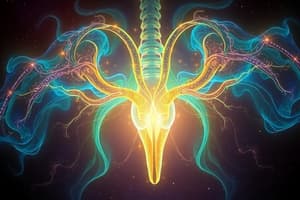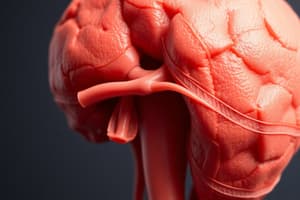Podcast
Questions and Answers
Which of the following best defines exocrine glands?
Which of the following best defines exocrine glands?
- They release hormones directly into the bloodstream.
- They are part of the endocrine system.
- They primarily function to regulate metabolism.
- They secrete substances that usually pass through ducts. (correct)
What is one of the primary functions of the hypothalamus?
What is one of the primary functions of the hypothalamus?
- Regulating muscle contractions
- Filtering blood
- Controlling body temperature (correct)
- Producing insulin
Which function is NOT associated with the hypothalamus?
Which function is NOT associated with the hypothalamus?
- Control of circadian rhythms
- Hormone secretion
- Thermoregulation
- Coordination of voluntary movement (correct)
Which hormone function is primarily involved in reproductive regulation?
Which hormone function is primarily involved in reproductive regulation?
What role does the brainstem, particularly the pons and medulla, play?
What role does the brainstem, particularly the pons and medulla, play?
Which of the following is a function of the endocrine system?
Which of the following is a function of the endocrine system?
In terms of neuroendocrine signaling pathways, what is a significant characteristic?
In terms of neuroendocrine signaling pathways, what is a significant characteristic?
Which aspect is primarily regulated by the hypothalamus in the context of biological rhythms?
Which aspect is primarily regulated by the hypothalamus in the context of biological rhythms?
What is one type of hormone classified as a peptide?
What is one type of hormone classified as a peptide?
Which function is primarily associated with the hypothalamus?
Which function is primarily associated with the hypothalamus?
What role does progesterone play in hormonal regulation of reproduction?
What role does progesterone play in hormonal regulation of reproduction?
Which of the following hormones is derived from tyrosine?
Which of the following hormones is derived from tyrosine?
What gland is responsible for the secretion of stimulating hormones?
What gland is responsible for the secretion of stimulating hormones?
The hormone relaxin is primarily associated with which process?
The hormone relaxin is primarily associated with which process?
What hormone is primarily responsible for the signs of proestrus in bitches?
What hormone is primarily responsible for the signs of proestrus in bitches?
Which amino acid is a precursor for melatonin synthesis?
Which amino acid is a precursor for melatonin synthesis?
What condition occurs to the corpus luteum if fertilization does not take place?
What condition occurs to the corpus luteum if fertilization does not take place?
Which component is NOT part of the spinal cord's structure?
Which component is NOT part of the spinal cord's structure?
What hormone is secreted by parafollicular cells in the thyroid gland?
What hormone is secreted by parafollicular cells in the thyroid gland?
Which hormone primarily raises blood glucose levels?
Which hormone primarily raises blood glucose levels?
Which structure separates the anterior pituitary from the posterior pituitary?
Which structure separates the anterior pituitary from the posterior pituitary?
What role does the adrenal cortex play in the endocrine system?
What role does the adrenal cortex play in the endocrine system?
What type of hormone is thyroxine classified as?
What type of hormone is thyroxine classified as?
Which hormone does the adrenal medulla secrete?
Which hormone does the adrenal medulla secrete?
What is the primary function of insulin in the human body?
What is the primary function of insulin in the human body?
Which of the following glands features follicular cells that secrete hormones?
Which of the following glands features follicular cells that secrete hormones?
Flashcards are hidden until you start studying
Study Notes
Pituitary Gland
- Ductless gland located below the hypothalamus
- Also referred to as the hypothesis
- Secretes stimulating hormones (SH) and prolactin
- Hormones are directly transported into the bloodstream for distribution to target organs
Pineal Body
- Also known as the epiphysis cerebri
- Located close to the hypothalamus and pituitary gland
- Secretes melatonin, which regulates sleep-wake cycles
Hippocampus
- Site for tissue collection in demonstrations of Negri bodies associated with rabies
- Involved in memory processing as part of the brain
Spinal Cord
- Composed of cervical, thoracic, lumbar, sacral, and caudal segments
- Also known as the medulla spinalis
Hormone Classification
- Peptides: Complex protein molecules influencing various bodily functions, e.g., hypothalamic, pituitary, and pancreatic hormones
- Monoamines: Derived from amino acids like tyrosine or tryptophan, including epinephrine, norepinephrine, serotonin, and melatonin
- Steroidal Hormones: Includes hormones from the adrenal cortex and gonadal hormones, except relaxin
- Lipid Hormones: Example includes prostaglandins
Endocrine Glands
- Hypothalamus: Located ventral to the thalamus; secretes releasing hormones impacting pituitary function
- Pituitary Gland (Hypophysis): Connected to the hypothalamus; releases stimulating hormones and has distinct portions for different hormonal functions
- Thyroid Gland: Composed of two lobes; secretes T3 and T4, regulating metabolic rate
- Parathyroid Gland: Near the thyroid; secretes parathormone, which increases blood calcium levels
- Pancreas: Contains islets of Langerhans that secrete insulin (lowering blood sugar) and glucagon (increasing blood sugar)
- Adrenal Gland: Located above the kidneys; divided into cortex (secretes glucocorticoids and mineralocorticoids) and medulla (secretes epinephrine and norepinephrine)
- Ovary: Paired structures secreting estrogen
Cerebellum
- Caudal portion of the brain known for its "arbor vitae," associated with balance and involuntary functions
Brain Stem
- Comprised of pons and medulla oblongata; houses respiratory centers influencing breathing patterns
Hypothalamus Functions
- Regulates thirst, hunger, thermoregulation, sexual behavior, and biological rhythms (circadian and osmolarity)
Endocrine vs. Exocrine Glands
- Endocrine glands release hormones directly into circulation for body-wide distribution
- Exocrine glands have ducts through which their secretions are transported to external surfaces or cavities
Studying That Suits You
Use AI to generate personalized quizzes and flashcards to suit your learning preferences.




